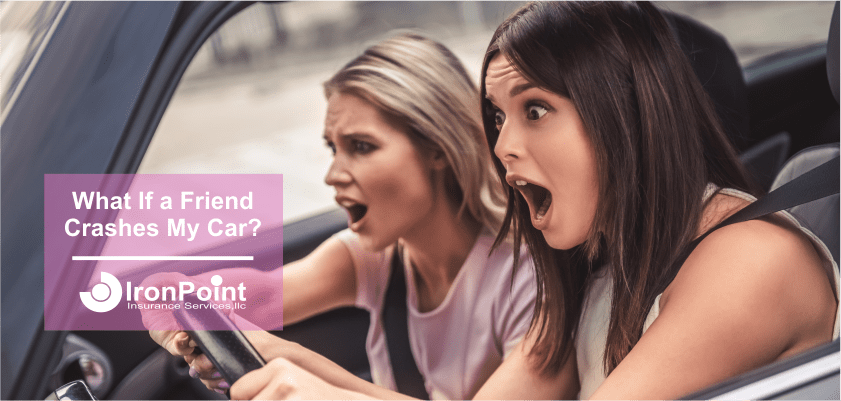What Happens if a Friend Crashes Your Car?

It’s a popular insurance myth that car insurance follows the driver. In reality, it typically follows the car. As a result, if your friend crashes your car it’s going to be your auto insurance policy that’s first in line to pay the claim. Of course, the nature of the protection depends on the limits and coverage purchased.
Now, what you really want to know is will the accident go against your claims history.
Well, the short and cautious answer to that question is – maybe. As a normal procedure, if your policy pays a claim, then your insurance carrier will report it to the reporting agencies. How they report the claim will determine if future insurance companies consider it for calculating your auto insurance rate.
However, if your friend crashes your car, a number of factors will come into play during the claims process to determine whose car insurance provides coverage.
How does my car insurance cover other drivers?
In many states, if someone else is driving your car, your car insurance is considered “primary.”
What does this mean?
Well, it means the coverage you’ve chosen on your policy would be considered first when determining the responsible policy to help cover the damage caused by the other driver. Moreover, your policy also defines a person who is “insured” on the policy as all the parties listed on the policy and anyone who has “permission.” So, if your friend is driving your car and is considered at fault for an accident, here’s how your auto policy coverage may help:
- Auto liability coverage: This coverage may help if the accident resulted in property damage or bodily injury. Liability coverage pays for injuries and property damage when you or your driver are determined at fault. Liability is not for you or the driver of your car, it is for the third-party or other people in the accident.
- Collision coverage: If you purchased collision coverage, it may help pay for repairs to your car. If you have to use your collision coverage, you will have to pay your deductible first, and the insurance company pays for the costs above the deductible.
- Medical payments coverage: If the driver of your vehicle is injured in an accident, they may be able to get coverage under medical payments. This coverage can pay for medical bills for you and your driver, regardless of fault.
Are other drivers always covered?
Before we go any further we need to outline some exceptions that may apply when other drivers, like a friend, have an accident in your car. Coverage should not be assumed for all circumstances. Here is an example where coverage may not apply, even if the other driver has permission:
- Resident relatives: some policies don’t provide coverage for relatives living in your home unless they are specifically named on your policy.
- Permissive user dropdown: Other policies, like nonstandard auto insurance policies, may provide coverage, but on a more limited basis.
- Excluded drivers: Before you let someone drive your car, make sure you don’t have them excluded. You may have excluded roommates, family members, or former romantic partners to save money on your premiums. Make sure you remove excluded drivers when they are no longer household members or frequent users of your car to avoid this mistake.
Keep in mind that laws vary by state, so it’s important to read your policy documents carefully to understand what’s covered. If you have questions about your coverage and how it helps protect another driver, ask your insurance agent to help clarify.
How does a permissive user work?
In order for your insurance coverage to apply to an accident involving an unlisted driver depends on your giving them permission to drive your car. This is referred to as “permissive use” and it’s controlled by the language in your insurance policy.
Permissive Use
We all understand that drivers listed as insured on your policy have coverage when driving one of the insured cars. What is less well understood is that a non-listed driver, as long as not a named excluded driver, may also be insured if they have your permission according to Nolo.com. Remember though, some policies may have limited coverage for permissive users, and there may be an exclusion for resident relatives or other household members not listed on your policy.
Non-Permissive Use
What if someone takes your car without your permission? For example, an out-of-state relative takes your car without permission and causes an accident. If this should happen, your relative’s insurance may be considered primary coverage, and your insurance could deny a claim. However, if your roommate doesn’t have insurance, you may still have to file a claim with your own insurance company to help cover the accident. Typically, these claims are not held against you. Nevertheless, regardless of who is driving, a non-permissive, permissive, or even a thief, you should report the claim as you have an obligation to the insurance carrier and they have the tools to assist you in resolving these types of issues.
Pro Tip
Be sure to read your policy’s terms and conditions. In fact, you should review these provisions with your insurance agent, so you understand what’s covered by your policy or in your state. You may also want to talk to your agent about whether you can exclude drivers from your policy.
What does the other driver’s insurance do?
In cases of permissive use, your insurance coverage can get a bit complex. This is especially true when the damages caused are extensive. For instance, if the accident caused injuries or property damage, in excess of your limits — the maximum amount your insurer will pay toward a covered claim — then the permissive user’s policy may come into play.
In our example, your friend’s car insurance policy may be tapped to help cover the remaining costs. For instance, if your friend causes an accident that results in $15,000 in property damage and your policy’s property damage limit is only $10,000, then their policy might then be tapped to pay the $5,000 difference. – this is called “secondary” coverage. Keep in mind, this is assuming the person driving your car has their own car insurance.
What should drivers without a car do?
If you don’t own a car, you likely don’t have car insurance. In most cases this is fine should you be asked to drive another person’s car or borrow a friend’s vehicle. If this is you, then here are some tips to make sure you have protection when driving someone’s car:
- The car owner’s insurance policy may help provide coverage if you get into an accident.
- If the car owner has insurance, you may be responsible for certain types of damage, depending on the coverage the owner’s car insurance policy provides.
- If the car owner is underinsured, you may be responsible for costs that exceed the coverage limits on the owner’s car insurance policy.
If you know that you will borrow a friend or family member’s car from time to time, it’s a good idea to understand their coverage before you drive. If you want to make sure you have protection, speak with an insurance agent as they can help you understand coverage, or help you get a nonowner insurance policy to provide you protection where the owner’s policy may have gaps.
The bottom line
Allowing a friend or family member to borrow your car from time to time is completely acceptable, and you likely have coverage. However, it is always best to review your policy or consult your insurance agent before confirming the nature of your protection first. And for those enterprising minds, the permissive user’s clause isn’t a way to provide insurance to regular users of your car, or to household members or family – and dodge some additional premium. Don’t make that mistake as you may find yourself without coverage.
Let’s Get Started
Select the way you want to start your quote.







